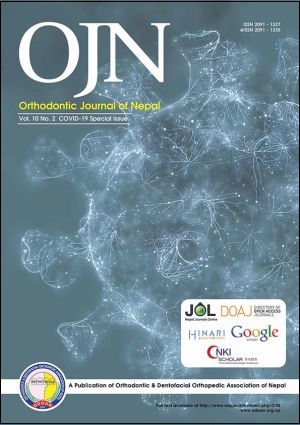Knowledge, attitude and practice towards management of orthodontic emergency during COVID-19 pandemic among orthodontic professionals
DOI:
https://doi.org/10.3126/ojn.v10i2.31145Keywords:
Attitude, COVID-19, Knowledge, Orthodontic emergency, Orthodontic professionals, PracticeAbstract
Introduction: An orthodontic emergency is a problem arising from an orthodontic appliance and the patient may experience pain and discomfort, where an unscheduled appointment might be required to resolve the issue. Dental care settings invariably carry the risk of SARS-CoV-2 infection due to the nature of procedures performed. The aim of this study was to assess the knowledge, attitude and practice towards management of orthodontic emergency during COVID-19 pandemic among orthodontic professionals.
Materials and Method: In this descriptive cross sectional study, evaluation of the knowledge, attitude and practice towards management of orthodontic emergency during COVID-19 pandemic were done by administering the online semi-structured questionnaire consisting of 20 questions to 120 orthodontic professionals of the Nepal through online platforms. The filled online forms were then documented for further evaluation.
Result: This study found that among the total of 120 participants, 74 (61.66%) were male while 46 (38.33%) were female. The mean age of the participants was 36.4±6.45 years while mean years of experiences was 6.15±5.55 years. Most of the orthodontists think that poking distal wire or ligature wire (87.5%) followed by periodontal abscess (85.8%) around the loose band as the most common orthodontic emergencies. Majority of the orthodontists recommended that, the patient should be triaged by telephone or through video call (79.1%), ask the patient to take picture and send to identify the type of problem (74.1%) while offer any interim self-care advise to solve the problem (58.3%) before face to face consultation. Around 57.5% of orthodontists were practicing only for urgent and emergency cases during this pandemic and lockdown.
Conclusion: This study showed that most of the orthodontic professionals had adequate knowledge about orthodontic emergency problems and had positive attitude towards their profession but the practice was limited due to COVID-19 pandemic and the risks involved in this.
Downloads
Downloads
Published
How to Cite
Issue
Section
License
Copyright © held by Orthodontic & Dentofacial Orthopedic Association of Nepal
- Copyright on any research article is transferred in full to the Orthodontic & Dentofacial Orthopedic Association of Nepal upon publication in the journal. The copyright transfer includes the right to reproduce and distribute the article in any form of reproduction (printing, electronic media or any other form).
- Articles in the Orthodontic Journal of Nepal are Open Access articles published under the Creative Commons CC BY License (https://creativecommons.org/licenses/by/4.0/)
- This license permits use, distribution and reproduction in any medium, provided the original work is properly cited.




